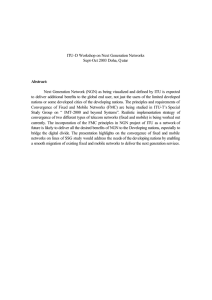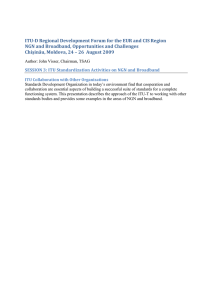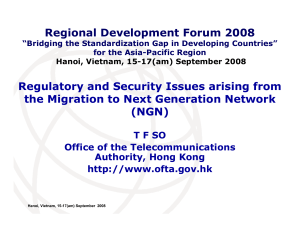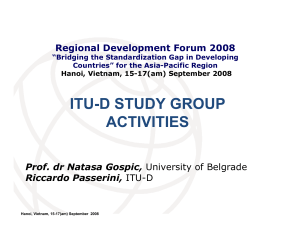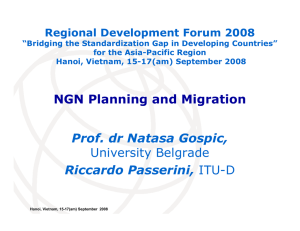ITU NGN Workshop Hanoi, Vietnam; 15-16 May 2006 OPENING REMARKS
advertisement
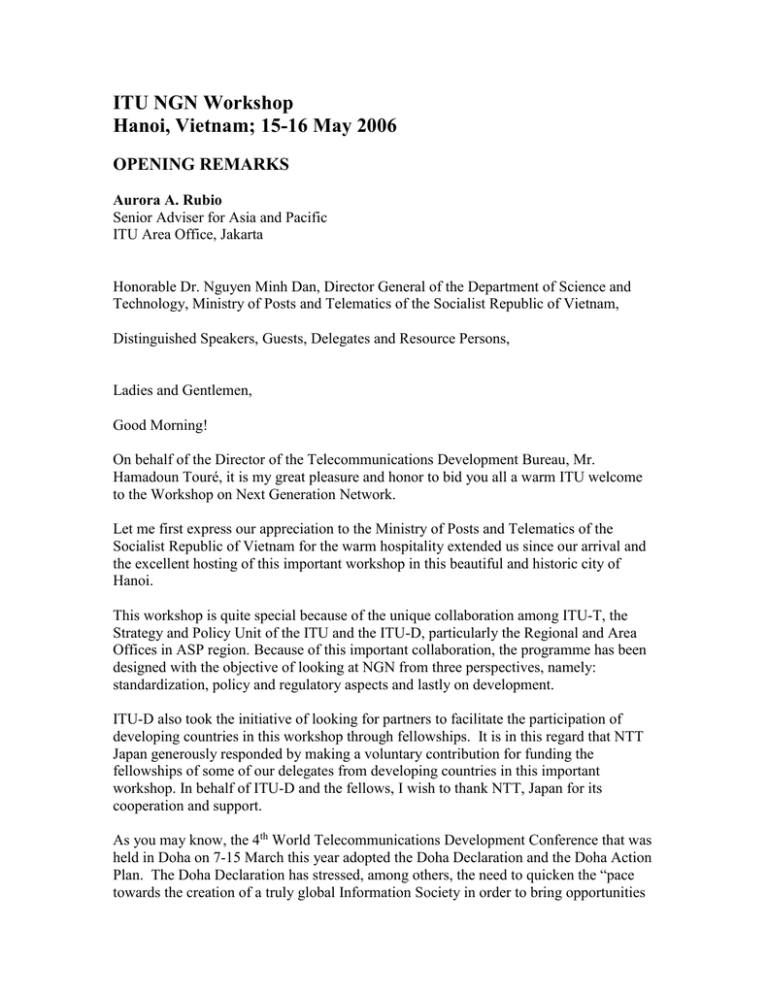
ITU NGN Workshop Hanoi, Vietnam; 15-16 May 2006 OPENING REMARKS Aurora A. Rubio Senior Adviser for Asia and Pacific ITU Area Office, Jakarta Honorable Dr. Nguyen Minh Dan, Director General of the Department of Science and Technology, Ministry of Posts and Telematics of the Socialist Republic of Vietnam, Distinguished Speakers, Guests, Delegates and Resource Persons, Ladies and Gentlemen, Good Morning! On behalf of the Director of the Telecommunications Development Bureau, Mr. Hamadoun Touré, it is my great pleasure and honor to bid you all a warm ITU welcome to the Workshop on Next Generation Network. Let me first express our appreciation to the Ministry of Posts and Telematics of the Socialist Republic of Vietnam for the warm hospitality extended us since our arrival and the excellent hosting of this important workshop in this beautiful and historic city of Hanoi. This workshop is quite special because of the unique collaboration among ITU-T, the Strategy and Policy Unit of the ITU and the ITU-D, particularly the Regional and Area Offices in ASP region. Because of this important collaboration, the programme has been designed with the objective of looking at NGN from three perspectives, namely: standardization, policy and regulatory aspects and lastly on development. ITU-D also took the initiative of looking for partners to facilitate the participation of developing countries in this workshop through fellowships. It is in this regard that NTT Japan generously responded by making a voluntary contribution for funding the fellowships of some of our delegates from developing countries in this important workshop. In behalf of ITU-D and the fellows, I wish to thank NTT, Japan for its cooperation and support. As you may know, the 4th World Telecommunications Development Conference that was held in Doha on 7-15 March this year adopted the Doha Declaration and the Doha Action Plan. The Doha Declaration has stressed, among others, the need to quicken the “pace towards the creation of a truly global Information Society in order to bring opportunities to countries and to create conditions aimed at deriving maximum benefits from the implementation of new services and applications in order to accelerate overall development”. The Doha Action Plan sets out the roadmap for the next four years to implement global objectives in order to harness the power of ICTs for development. The Action Plan is based on a mutually reinforcing strategy for telecommunication development to be implemented at the global, regional and national levels and builds on the outcomes of the World Summit on the Information Society. The Conference also recognized that new and emerging technologies and services have significant impact on the expansion of telecommunications and have the potential to close the gap not only between developing and developed countries, but also between urban, remote and rural areas and between well-served and underserved areas within a country. There is also recognition that these new technologies and services also provide opportunities for e-applications and e-services, i.e., e-learning, e-health, e-government, disaster relief and response and many other applications which are highly beneficial to political, social, cultural and economic development, and general welfare of any country. The Conference identified 6 programmes, which define the focus of work of the Development Sector in the next coming years, namely: (1) Regulatory Reform, (2) Technologies and telecommunication/ICT network development, (3) E-Strategies and eservices/applications, (4) Economics and finance, including costs and tariffs, (5) Human capacity building, and (6) LDC Program. Programme 2: “Technologies and Telecommunication/ICT Network Development” is designed to assist Member States and ITU-D Sector Members in developing and least developed countries to maximize their utilization of appropriate new technologies in the development of their telecommunication networks. This includes increasing awareness and knowledge of the transition of digital planning strategies and tools for evolving network architectures to Next Generation Networks and applications. This workshop presents an excellent opportunity for increasing such awareness as it provides a venue for policy makers, regulators, technology and service providers and other important players to exchange information, views and experiences on the different issues related to NGN. Our two-day workshop will discuss topics and issues such as NGN service requirements, migration scenarios and strategies, policy and regulatory aspects of NGN and some NGN development trends and case studies. It is our hope that this workshop will improve our understanding and appreciation of issues and challenges facing us in promoting innovation and technology advancement. For this seminar, we are thankful to have a line up of excellent speakers and resource persons. I therefore would like to invite all of you to take advantage of the presence of these experts and your counterparts in other countries of the region, to actively participate in all the sessions of the workshop by sharing your views and experiences and to raise any questions or issues you have regarding the subject. Your active participation in this workshop will greatly contribute to its success. I wish all of you a fruitful workshop and a wonderful stay here in Hanoi! May I also greet you an advanced Happy Information Society Day that will be celebrated on 17 May! Thank you very much.
